The Bliss and The Pain of Tennis Nostalgia
Rafael Nadal got a very emotional tribute at Roland-Garros, reunited also with the rest of the Big 4. Nostalgia hit hard, with happy memories but also a sad reminder of how that era is over.
Welcome back! Thanks for joining :)
In today’s edition, I’m, of course, spending some time talking about Rafael Nadal being honored at Roland-Garros on Sunday, joined by the rest of the Big 4. Gosh, it brought all the feels! I’m then sharing two exclusive interviews with Barbora Krejcikova and Hamad Medjedovic. You can also listen to Victoria Mboko after her first-ever win in a Grand Slam main draw.
This publication is supported by readers, so if you like what you’re reading, don’t hesitate to spread the word, try a paid subscription, like this post, or leave a comment, as it helps TSS discoverability. You can also prefer to buy me a cuppa!
The Bliss and The Pain of Tennis Nostalgia
It was the best of times, it was the worst best of times. “It was the age of wisdom, it was the age of foolishness, it was the epoch of belief, it was the epoch of incredulity, it was the season of light, it was the season of darkness, it was the spring of hope, it was the winter of despair.” Thank you, Charles Dickens. I am French, so I have no idea why that quote literally jumped into my mind when I started to write about all of this, but it’s fitting!
Because: Gosh, I miss them so much. That’s honestly what was in my mind the most when, after an already very emotional first part of that ceremony for Rafael Nadal at Roland-Garros, we saw Roger Federer, Novak Djokovic and Andy Murray entering the court. I knew they were there as the info had leaked at the end of the morning, but still seeing them out there for this occasion reminded me - and reminded everyone, them included - how much 1) they did for the sport, 2) they meant to the sport 3) incredible the Golden Era had been 4) it was over.
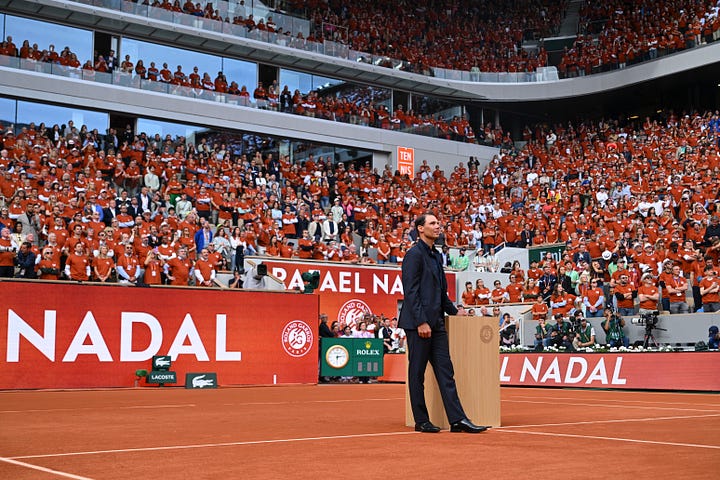

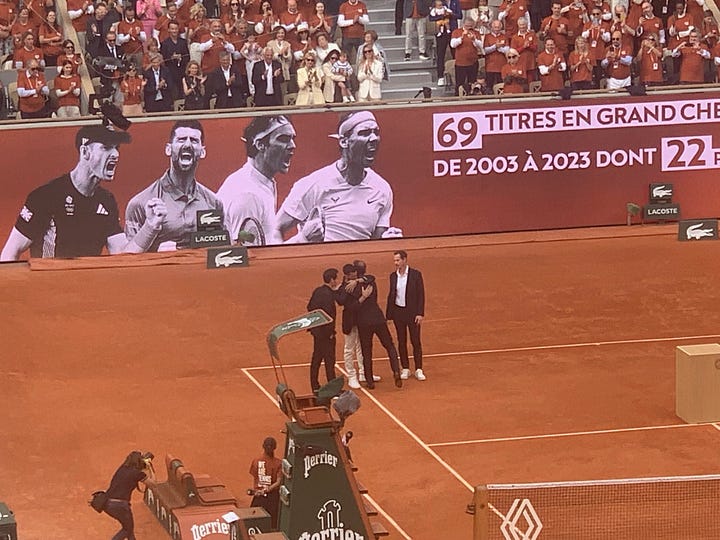
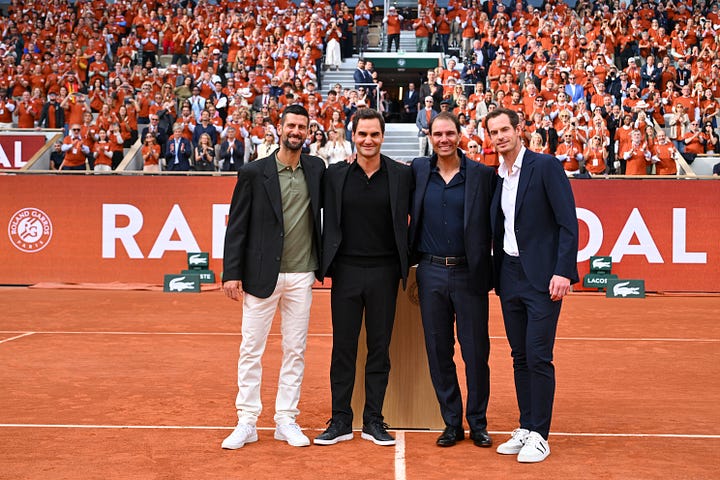
You don’t need me to tell you what happened during this ceremony as it’s everywhere, so instead, let’s do a “stream of consciousness” musing about it all. Side note: That plate with Rafa’s footprint looks so cute, and he was crying like a baby when they uncovered it omg.
Early on Sunday, I was saying that what tennis needed was actually a Big 4 celebration. To close the chapter, to pay them the respect they deserve. To thank them for changing the sport. Every male player currently making a fortune with the game owes it to the Big 4. For the way they played, for their results, and for how they did the job off the court. So once they’ll all be retired, let's throw them a party because they matter nearly more together than each, individually. A few hours later, I learnt they would be reunited for Rafa’s ceremony. How often in life do you get what you wish for that fast?? lol. Of course, it was first and foremost a ceremony to honor the insane Roland-Garros career of Rafael Nadal. But it is impossible to untangle it from the era in which it happened. Rafa himself cannot and doesn’t want to. It was very interesting to see that the moment he had no need for his notes was when he had to talk to them. It just flowed.
“It was also telling when Nadal told the other three how he hoped they’d continue to work together to keep the sport where they left it: on a high.”
I loved when he basically told Novak that soon he’d see that when retired, the usual tension of the rivalries, even when respectful, disappears to give place to a pacified bond. And it was also telling when Nadal told the other three how he hoped they’d continue to work together to keep the sport where they left it: on a high. I’ve said it so often, and I’ll keep saying it: The Big 4 ain’t going nowhere. They can’t leave that sport; they don’t want to leave that sport. The power they built as The Avengers isn’t something they’re going to let go either. They are the most powerful players in history, and it’ll keep having consequences. I was also thrilled to have it yelled from the Chatrier rooftop that there is no Big 3, there’s never been a Big 3, as it’s always been a Big 4.
The Big 4 is a tennis trademark. Respect the copyright.
The Big 4 is a domination history, and Andy Murray was a key part of it, helping the four of them to trust every semi-finals and finals for years and years. Murray, without the other three, would have over ten Grand Slam titles in the bag. It’s also a question of the level of the game: Andy Murray was the only one able to contest the other three for over a decade. He was as much a “Team Avengers” to the rest of the field as the other three. The four of them were ruthless, piling the titles and the dollars on and off the court. Body willing, their tennis would still erase 80% of the rest of the field to this day.
People who haven’t experienced the Big 4 era at the time cannot understand the level of influence and domination they had on the sport. Nor the level of intensity of their rivalries. So, on Sunday, it was nice to see the memo being sent again and the Big 4 to be called the Big 4. As some are already ready to send Jannik Sinner and Carlos Alcaraz into the same league, Nadal’s ceremony closed the door on that: the Italian and the Spaniard hold, for now, absolutely no comparison to that era. Not to FedAl, not to RafOle, and even not to NolAndy. They don’t have the amount of legendary matches in the last stretch of the biggest events, the longevity or the scars to belong in that club for now.
I feel so lucky that I started my career at the same time the Big 4 started its Golden Era. It’s a blessing but also right now a curse because now that it’s over, it’s very hard to get 100% passionate about what’s coming next. It’s a transition that needs to happen, but it’s impossible to forget what we’ve lost. Also, because it lasted so long! Djokovic is the last one standing at 38. Andy and Rafa left only last year. Roger was still there in 2022. There are several generations of tennis fans and tennis media that haven’t known anything else in men’s tennis than the Big 4 standards. Well, good luck with trying to lower that bar!
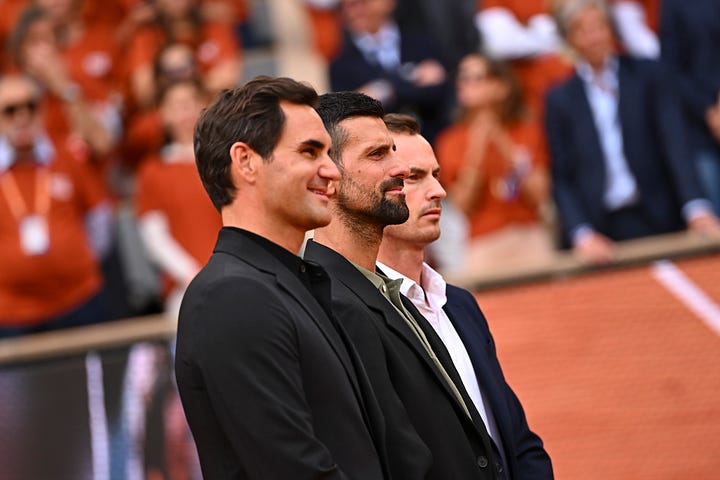
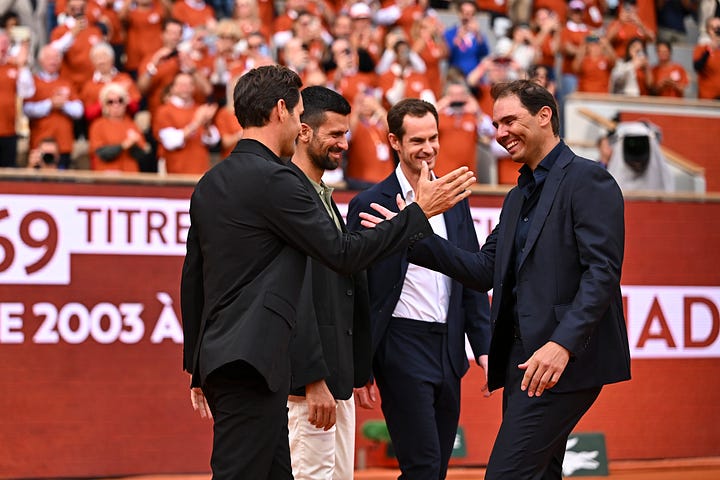
Nadal was so emotional on Sunday, so happy to see all of it done for him. He talked about being respected many times. Said the Big 4 legacy was also how they behaved throughout the years and the intensity of their rivalries: they always kept things respectful. I’d correct him and say for 99% instead of always, but it never went really far ;) They showed you could be the biggest rivals and stay Gentlemen overall about it. And so yeah, the Big 4 was tennis perfection.
“The connection that they have with crowds all over the world (and so business markets and media, by the way) is still so much stronger than with anybody else.”
It was something that never happened before and will never happen again because it shouldn’t have happened at all. You can’t get four guys at this “cosmic tennis” level for like two decades. Four guys with enough differences and similarities to make it the perfect cast. Four personalities - real personalities owning their ego - who were the tennis version of Hollywood. You usually get a couple of them. Not four. Even less with the age gap between Federer and the other three. Even if Nadal said that if he found a way to win 14 Roland-Garros titles, that means somebody else could do it, allow me to doubt that.
The amount of records Nadal holds in Paris resonates even more in the context of the amount of records the Big 4 holds in the sport. It’s actually also men’s tennis curse: it’s owned by the Big 4 and will live in its shadow for a very long time. And I am convinced that the Fantastic 4 will regularly pop back up to prove that point, as long as they deem it worth it. A constant reminder, like on Sunday, that they’re still calling so many shots and haven’t been replaced. The connection that they have with crowds all over the world (and so business markets and media, by the way) is still so much stronger than for anybody else.
They got there by understanding the obvious: as much as they were rivals, they knew how much they needed the other three to improve and also to matter. They also understood that if they wanted to get the biggest paychecks, they had to deliver: they’d get the biggest appearance fees in the game, and they’d get to that title match, do the interviews, do the sponsors’ activities. Nadal was again the utmost professional on Sunday, spending one hour with the press. Reliable was their second name and their currency.
The Big 4 is, for me, the greatest tennis business case as much as the greatest tennis era. They had it all, and they used it all. They gained some lasting and “not a given” friendships on the way. I mean, Federer and Djokovic were chatting on their way out of the Chatrier. And if you know, you know. Gosh, I miss them so much. As I write this, I wonder if that’s also something Novak might have felt on Sunday! Or Andy. Or Roger. Or Rafa. So yeah, I wonder who will now find a way to convince the band to get together again! And it’s not “if”, it’s “when”.
The Nadal moments that got to me on Sunday, funnily enough:
Hearing the crowd chanting his name while waiting for him. Reminded me of how that Parisian crowd in 2009 was chanting for Robin Söderling and clapping out of joy at Rafa’s mistakes when he lost here. They, weirdly enough, just needed to see him lose to have the proof he was human, just needed to see his domination interrupted, needed to see Roger Federer finally having a shot in Paris. But since the moment he came back in 2010, it was just love at every corner. Out of guilt, first, surely. And then the misunderstanding cleared. I was there in 2009, and the level of disrespect that day was horrible to witness, so seeing that court entirely devoted to Nadal 16 years later was something else.
The Moment when he arrived on Chatrier. The crowd was losing its mind; it was one of my favorite songs, and then we got such a magistral standing ovation with Rafa just letting it all sink in. That was probably the moment when the fact that Nadal had really left the sport hit me.
I also would be at a loss to pick through my memories of Nadal at Roland-Garros. They were so many! Watching him train on his favorite court 5, getting a smile and a “Bonjour, comment ça va ? (“Hi, how are you?” in French) when crossing him around the players’ area, the interviews in French with Toni after the title was secured (I loved the Toni era), all the times Rafa would say he wasn’t the favorite for the title at press, the birthday celebration, the final (2012, I think) where out of nowhere he said he spent the night before watching Dragon Ball Z. Or that year he was playing against Fognini, and he got mad about the scheduling as it had something to do with Fognini playing doubles or whatever, and I asked a follow-up question about it, and he was just like, “But what do you think? Do you think it’s fair? No, really, give me your opinion” and wouldn’t let me off the hook about this.
Rafa cared so much about Roland-Garros, and vice versa, that he really elevated that tournament, in my opinion. There was a special vibe in the whole place when he was in the draw. We all had our “Rafa routines” during the event regarding the coverage. Mine was to try to get an exclusive interview with him for French magazines ahead of the event, and he rarely said no, so I can only thank him for that. I’d also spend time watching him train because the way he worked was as fascinating as the way he competed. A lasting mystery was how he would kill that ball at practice and then go into the matches taking half that power off.
I also really think that Djokovic coming on his turf to contest his clay domination made it even greater for Rafa in the end. Damn, the day of their matches was just feeling different. The electricity in the air. The tension. That 2013 semi-final will remain in tennis history, the same way their AO 2012 final. Have I told you I was missing them so much already or?
BARBORA KREJCIKOVA: “It took me at least three months to get rid of the pain.”
Barbora Krejcikova had a fantastic 2024 season, winning Wimbledon and reaching the semi-finals at the WTA Finals. But then the back issue she intended to fix during the winter took her out for six months. The Czech finally found her way back to the Tour on clay in Strasbourg, showing a very good level already in her first match, and she is hoping to be now able to get going. In this exclusive interview, she explains what she went through and how, somehow, it brought the fire back in her to commit to the game.
How do you feel coming back to Roland-Garros? I mean, you had just one tournament and one match to prepare in Strasbourg, but I watched that match and it looked well for a comeback, no? How do you feel?
Barbora Krejcikova: Thank you. Well, the result wasn't there, obviously, but overall, I'm happy to be back. I'm happy that I'm enjoying tennis very much right now. It's nice to be back after the struggles that I was going through. I'm looking forward to having more matches, and hopefully, I can get the first win very soon and go from there. The most important thing for me, coming back right now, is health. And I hope it's going to stay the way it is right now.
For people who might not have followed everything, can you just summarize how that back injury (inflammation) ended up sidelining you since the WTA Finals at the end of last year to Strasbourg this year?
Barbora Krejcikova: Last year in Ningbo, I had to retire, but I was already playing with this injury for the whole season. So I was really playing through a lot of pain throughout the whole season, so after my very last match in Riyadh (she lost in the semi-finals against Zheng Qinwen after beating Jessica Pegula and Coco Gauff), I knew I had to fix that, but I definitely didn't expect that it would take six months. But it could have been longer, so in the end, I'm happy with the six months.
Yet, in the beginning, it was very difficult. Even during regular days, I couldn't really get out of my bed, and I couldn't use the muscles because they were weak and they were like protecting the injured area. It was just difficult to live a normal life even without sport. It took me at least three months to get rid of the pain, and I got to the point during that break where I thought, “OK, I'm never going to get rid of this pain” because I'm not the youngest anymore. I was having this mindset, which was difficult and not very positive. But that was how it was.
“I knew I had to fix that, but I definitely didn't expect that it would take six months.”
And then I started to miss tennis a lot, so I played twice a week on a mini tennis court with baby balls. I was really looking forward to starting playing, but I was still in pain. But eventually, with time and the sessions, the pain got a little bit less. And the muscles started to react better and with all the treatment and everything that I've done. Oh my God, it was tough! It was tough. I had to do so much work. It was improving, improving, improving, and then I was supposed to play one week earlier, but I got sick four weeks ago. I had the flu. So, it was a setback again, and I had to start again, building the physique and everything. So that's why I only started in Strasbourg, but I'm happy. Strasbourg went well, even though there were no victories, It's OK. I feel good. I feel hungry. The most important thing is that the back is holding and could go through the matches without getting any worse. So I'm very happy with that, and I'm looking forward to adding to that.
Are you playing pain-free? Did you have to change the way you're playing to help the back?
Barbora Krejcikova: No, I didn't have to change anything, but I was waiting for a longer period just to have it pain-free. I mean, now it's pain-free, but I have some tightness in my back, which sometimes is like holding me a little bit back. It depends. Sometimes it's more, sometimes it's less. There's going to be good days, there's going to be bad days and I have to get through that. It’s the process. With time, the back is going to adapt, my tennis is going to adapt and everything will come together. But I need time.
“With the back, I couldn't really do anything. For the first three months, I was only on the table doing the physiotherapy.”
Unfortunately, you have experience with injuries like what happened with your right elbow a few years ago. Does it make it easier to come back from them, or is it worse because you're like, “Damn, another one”?
Barbora Krejcikova: I mean, it's definitely tough to have the setbacks, especially when you want to play, and you're doing well, and then you have to stop. On the other hand, with the elbow, I couldn't play, but I could do everything else. With the back, I couldn't really do anything. For the first three months, I was only on the table doing the physiotherapy and a lot of treatment, but I couldn't work out. I couldn't do anything. I was just watching tennis on the sofa, like a regular human being.
But I also enjoyed other things; I met a lot of new people, and I had more time for different things, for my family, for my friends, and the stuff that is like outside of tennis. I visited a lot of events. It was very nice. I went to the theater, to the cinema, like a regular person. And then, yeah, eventually, when things started to get together, and I started to get pain-free, then I was happy that I'm on the court, and then all these events are done, and I can play again.
Coming back right before a Grand Slam is rough… I mean, you're a big champion: You won here, you won Wimbledon. How is it to be aware that, logically, you can’t hope to win Roland-Garros this year? Or maybe you still feel you can!
Barbora Krejcikova: You know, I mean, the ball is yellow, and it's rounded and whatever. I mean, anything can happen. On the other hand, definitely, I'm not a favorite. I don't have this pressure on myself. So even though I'm seeded, and I'm ranked higher than most of the players, it doesn't really mean anything because I was out for six months. That's the way it is. So, I definitely have no pressure, and I can only get better and improve, fitness-wise, tennis-wise, mentally-wise, everything. But I think that the little extra that I have that maybe players don't have is that I have more of that extra mental power because I feel more fresh. I did different things, and now I'm coming back, and I'm really excited, whereas, obviously, when you are in the middle of the season, you played so many tournaments already, so it's just very tough for that mental part. So I believe this can be, on the other hand, my advantage as well.
“I'm more hungry right now than I was six months ago, so that's very nice.”
Are you surprised at how much you still love coming back and playing at this level despite everything you got through? Were there some days when you were like, “I can't believe that I'm still doing this!”
Barbora Krejcikova: You know, it's always up and down, and I feel like, before the injury, I was in a different mental state than I am now. I'm more hungry right now than I was six months ago, so that's very nice.
You missed it so much that it brought the fire back?
Barbora Krejcikova: Yes, I think so, yes.
Have you thought about the moment you're going to come back to Wimbledon already?
Barbora Krejcikova: To be honest, I was very happy that last week I was in Strasbourg, that I started somehow, and that I was able to get through the matches and maintain my back, and everything was going quite well. I also was able to have a couple of good sessions of practice. So, let's start there.
Did you fear at some point that you’d miss Wimbledon?
Barbora Krejcikova: Well, no, I was hoping to be fit for Paris when I started my preparation. I was trying to prepare my game to be ready to play on clay, and I was hoping that if everything went well, I could play at least one tournament. Obviously, at one point, I was hoping I could play two, but it didn't happen, unfortunately. But I'm happy that I played at least one so I could see where my level was at a bit. So I know a little bit. I played against Magda Linette, who had great results this year and is Top 30. So I had a really tough match coming back, and I had my chances. The match wasn't that bad. So, I believe I can only build up from that, and I'm looking forward to that.
You said you were watching tennis when you couldn't play. Some players just don't want to hear anything about tennis when they're injured, but you still wanted to watch…
Barbora Krejcikova: (She laughs) I mean, definitely the first six weeks after I finished Riyadh, I didn’t want to watch, so there were no tennis tournaments, no exhibitions, nothing. But then I saw the Austrian Open finals, and then I watched a couple of matches from Linz, same Doha-Dubai. No Indian, no Miami because of the time difference. But then, I mean, I actually went to Stuttgart in person, so I saw a little bit there as well. And yeah, from then on I was playing, playing, practicing, so I didn't see anything yet.
It’s often that, when you’re injured and can’t play, we hear people from the tennis world, as well as the fans, say they miss seeing your game and that they hope you can get back at the top. Do you feel that, because you play such a different game, people really enjoy seeing you out there?
Barbora Krejcikova: I don't know if I'm really aware of that. I'm very happy that people like my game, support me, and miss me. Definitely, I'm very happy. And it makes my heart really warm. But I wasn't really following that as I was really focusing on that recovery. And then again on the tennis and on the comeback and all this. But I'm definitely pleased that fans are missing me, and I hope they're going to cheer for me.
On the same topic:
ROLAND-GARROS
Hamad Medjedovic: “Expectations were really high, which is not so good…”
The Serbian won the ATP NextGen Finals against Arthur Fils in 2023 and has since then tried to climb through the ranks. Hamad Medjedovic (21), who reached the final in Marseille this year, also had to deal with the pressure of being called “one of the next big things.” With his incredibly easy power and his spectacular game style, Medjedovic (#74) was and still is on everyone’s radar. I chatted with him at Roland-Garros about it all, including the wild cards issue and how Novak Djokovic remains an important piece of his tennis puzzle.
So last year, you had to go through qualifications here, and now you're directly in the main draw. How does it feel?
Hamad Medjedovic: So different, honestly. It's way easier not having to play qualifications where it’s three very tough matches. I've qualified three times, but all three times were really tough. All the good players are there, and it really feels better to come here and prepare straight for the main draw.
“I was really feeling different compared to last year”
Winning that first round, did you feel like you were a different player than last year?
Hamad Medjedovic: Definitely. I was really feeling different compared to last year because, as I said before, it's so different when you're coming from the qualifications. You feel exhausted mentally and physically. So today, I was ready; I was focused on my opponent for the last three or four days when the draw got out. So it was very different and much easier for me.
How do you feel the road has been since you won the next-gen finals? Has it been as quick as you wanted?
Hamad Medjedovic: No, not really. It was bumpy. It was up and down. But it is what it is. Let's say after that title, I put a little bit of pressure on myself. Expectations were really high, which is not so good to do when you're a tennis player. But now I'm a little bit more mature than I was, and I handle the situation a bit better than I used to.
Do you think it's also because of your game? You're taking your chances a lot, you have a lot of power. Maybe that's the time it takes to get it together.
Hamad Medjedovic: Yeah, definitely. Tennis is a really beautiful sport, and the year and the season are so long, and there is so much room to be and to get better. I'm trying to improve at each tournament, each day if I can, and I try to stay consistent.
You were playing incredibly well in Marseille when you reached that final. Then you got injured…
Hamad Medjedovic: It killed the momentum. Yeah, definitely. I felt like I was really in my momentum since the beginning of the year. I've won a Challengers, then I beat Rune in the Davis Cup, then I reached the final in Marseille, beating Stefanos Tsitsipas in Doha also. But then I had to stop playing for three or four weeks, so coming back was not so easy. As I expected, the injury was still there. But now luckily I'm healthy and back again.
Clay season was also tough. Do you think it's because the surface might not be your favorite?
Hamad Medjedovic: No, I don't really know why. I love clay. I really do. Last year, I had a very good season on clay. The first Challengers tournament I won was on clay. Also, my first ATP final was on clay. Let's say it was just like that. It's true that I lost my momentum a little bit after Doha, and then it was not easy to come back. When you're Top 100, you're playing all the events; you're not playing Challengers, and the level in these tournaments is so high. Everybody knows how to play good. So it's not easy. It takes a little bit of time to adjust to that because it's something new. But here I am, trying to find my momentum again and keep going.
“Now I'm there, living my dream.”
It seems you’ve spent way more time having to go through qualifications than other promising players in your age group who got wild cards, and that feels a bit weird no?
Hamad Medjedovic: Yeah, unfortunately, it's like that. We were not able to get the wildcards. Honestly, I never expected it. It was only for Australia after winning the NextGen Finals that I thought I might get a wildcard, but no, they gave it away. They had their players, so I accepted it. It is what it is. We cannot change anything.
Do you feel it has made your climb even better because you had to do it from scratch?
Hamad Medjedovic: Yes, for sure. And also, it's true that in other tournaments, I got the wildcards. Not huge events, but ATP 250s, I got a few wildcards, and that really helped me. So, yeah, I'm really grateful for the whole journey. It's so fun.
Do you like life on Tour?
Hamad Medjedovic: Yeah, definitely. It's not as easy as everybody thinks because every week you're traveling and you're away from your family most of the time. But it's nice. It's something that I've been dreaming about since I was a kid, since I held the racquet for the first time. And now I'm there, living my dream.
“In the end, you need to pave the way for yourself.”
You were talking about the pressure you put on yourself. Do you also hear that people keep saying, “He's going to be so good, he could be top 10”?
Hamad Medjedovic: Yes, I've had these situations, and before, it affected me a little bit. Hearing from maybe a good coach or a good player that “You should be maybe top 50” and I'm losing Challengers first round. (He smiles) It was not easy, but it's something you learn from. You try not to really pay attention to the comments. It's always nice when someone tells you something nice about your tennis or your personality, but in the end, you need to pave the way for yourself.
“He's one of the people who helped me to be where I am now,” Medjedovic says of Djokovic
Has Novak helped in any way with that?
Hamad Medjedovic: Yes, yes. I've said it many times: he played a really important role in my career. Even now, he's like a friend to me, like an older brother. I always ask him for advice. He even tells me without asking. We practiced many times. When I was transitioning from juniors to pros, he was helping me financially, too. He's one of the people who helped me to be where I am now. He helped me a lot, and I'm really grateful for that.
Have you set any kind of goal for the end of the season, or you don’t like setting any, maybe?
Hamad Medjedovic: Well, I'm trying not to, honestly, because then you put expectations on yourself. And if you don't achieve it, you're probably not going to feel so good. I try not to think about it, just to play each tournament and see how far I can go.
You don’t watch Alcaraz and Sinner, thinking “Get ready for me, guys!”?
Hamad Medjedovic: Well, I think that's what every player thinks. And every player would like to face them one day and be equal to them. But the truth is that these guys are at the moment on a completely different level. They're playing really good tennis, and they're consistent every week. So, hopefully, I can be in a position one day to fight with them.
Listen to Canadian Victoria Mboko after her first-ever win in a Grand Slam main draw. She talks about being inspired by Serena Williams and Bianca Andreescu dealing with her knee issue and being on a roll this year. I talk to her in French for Radio Canada, so even if I was in the room obviously for the English part of her press conference, you won’t hear me there ;)
SOME BREAK POINTS…
❌ I am absolutely shocked about this. Gaël Monfils terminated his collaboration with coach Mikael Tillström right before Roland-Garros. Tillström confirmed to me that it was indeed Gaël’s decision. The Swedish coach saved Monfils’ career twice, and I cannot understand what happened here, but that’s professional tennis for you sometimes. And if you’re a regular reader of TSS, you’ve read all about how coaches these days are going through it. I’m now curious to see what Gaël is going to do:m looking for another coach or going solo for the very last stretch of his career?
✅ 100! Novak Djokovic was derailed in Miami by Jakub Mensik, but he was not to be denied at the Geneva Open by Hubert Hurkacz, and so he clinched that title n°100. Down 4-2 in the third set, Djokovic really showed he can still muster some fire when he still found a way to win that one (5-7, 7-6(2), 7-6(2). The ATP has a compilation of the 100 Djokovic titles here. Djokovic has now joined Jimmy Connors (109) and Roger Federer (103) in the 100 club. Rafael Nadal stopped at 92. They are, however, all still very far from Martina Navratilova’s singles record of 167!
☝️I thought I’d link to a few features that you might want to catch up with as we’re getting into Roland-Garros:
EDITOR’S PICKS:
READ: I really liked this piece from
about Stefanos Tsitsipas and his backhand issue. It’s a technical deep dive into what’s happening with that shot. Highly recommend.READ More: And that piece from
about The Best Weird Backhand On Tour (that for me is actually a forehand, à la Bartoli) is really good, too. I love quirky tennis stuff like that.




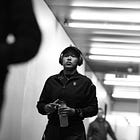
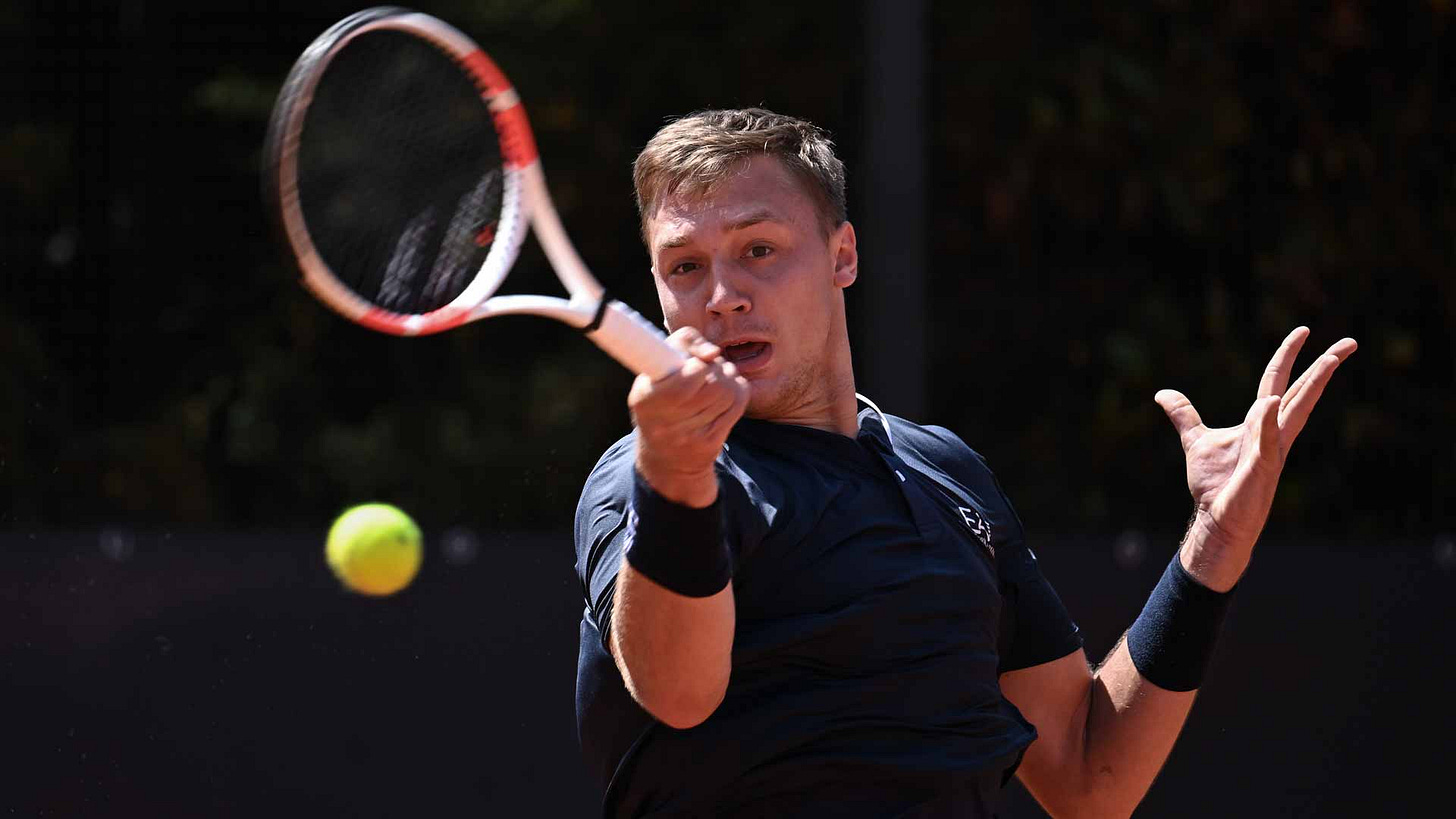
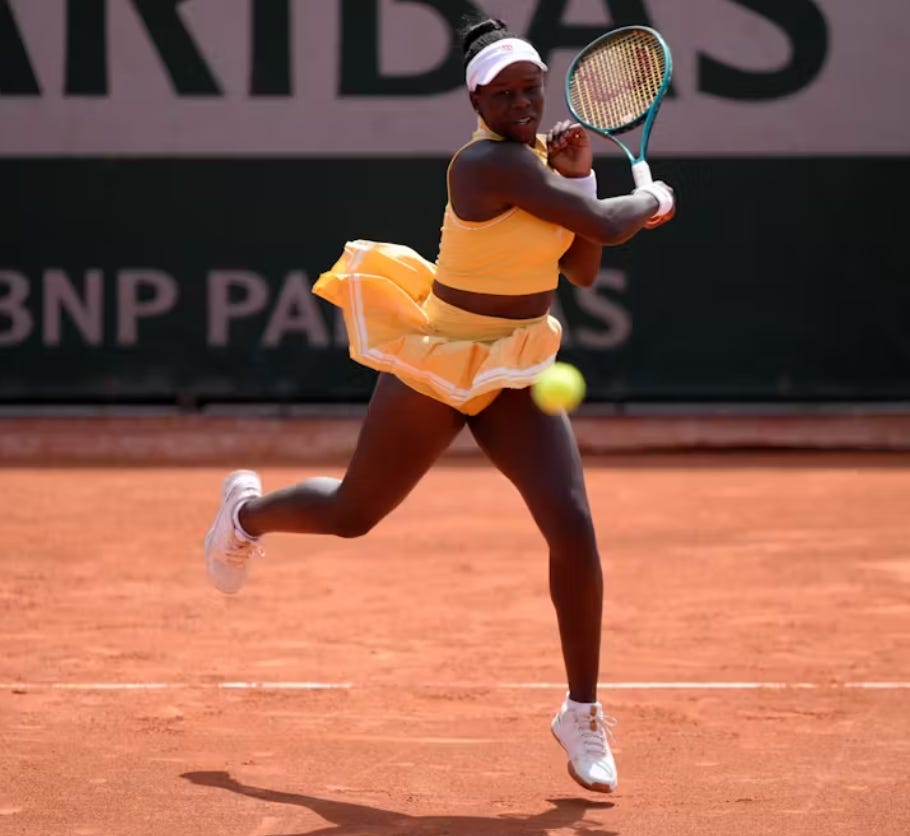




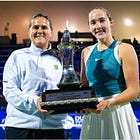


Thanks for the pick Carole:)
Also a big Hamad fan and I think he's in a very interesting section of the draw.
it's just too good!